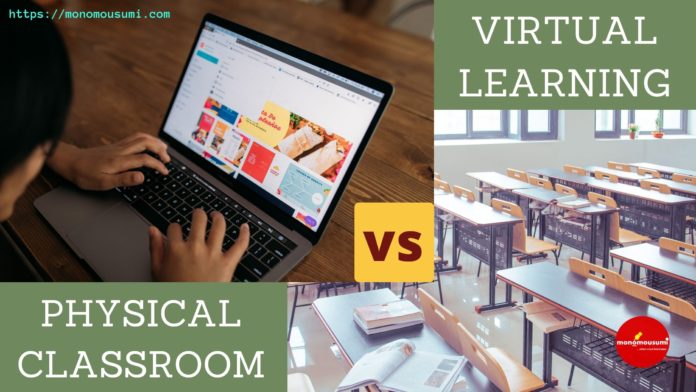The world is going through a rough patch of time and people are finding it very hard to normalize the situation due to the inability to prognosticate what the future beholds. While every sector has gone through a lot of deviations and inconsistencies, Education has suffered the hardest blow. The classroom benches have been replaced by beds, blackboards by virtual teaching screens, uniforms by casuals and even by night suits at times. The students are indebted to technology that has ensured that their classes continue and their valuable time does not go in vain. Had this pandemic hit the world even 10 years back, the situation could have been badly intensified by many folds. Online Education has rescued the students like a guardian angel. But the question that stems out is that whether virtual learning has measured up to the standards of education provided by Conventional Offline teaching? In spite of the assistance and convenience provided by online classes, they have unquestionably hauled down the quality of education.
The student-teacher interaction holds an indispensable worth in academics. While it may not have been disturbed for the students who were already very attentive and active in physical classrooms, it has definitely affected the ability of the already timid students who find it hard to clear out even the slightest of queries. Physical Classrooms ensured that even if the student is not very observant and alert, they at least attended the classes and managed to drive out something from the discussions. It is relatively very easy for the students to be out of the educator’s sight in online classes. It is very hard for the teacher as well to keep scrolling out to check the presence of the students. Schools and Colleges are regarded as one of the most important agents of socialization. Students are missing out on all the practical knowledge they could have acquired in facing on ground situations. Peer interaction also plays a pivotal role in a child’s overall development. While it is not very hard for the high school and college going students to maintain peer interactions, it is certainly a great loss for young school going students who will miss out on a major aspect of their mental growth. Let us keep privileged students aside for some moments and ponder upon the issues faced by the students who are already deprived in terms of technology, guidance and resources. Somehow, even if they manage to get tablets and phones there is no one to ‘push them’ to succeed. They have lost the only guiding force that was available in terms of school teachers and mentors. Talking specifically about Indian Education System, it has always stressed upon making notes and submitting hand written assignments. While it is deemed to be useless by some critics who find it difficult to write, it plays a refining and enriching role in the overall progression of academics. Online classes have almost vanished the notebook making culture, especially for the senior classes. Coming to the Examination system, are we playing a fair game? Certainly we are trying to but it is impossible to have a completely transparent online examination system as the students are highly tech savvy and somehow manage to find loopholes and use them to their advantage. Even the strictest mode of online examination known as proctored test does not guarantee fair evaluation. Physical Classrooms were not just mere providers of quality education, but were also responsible for imparting essential life skills. Waking up on time, dressing up smartly, following protocols, and behaving in a disciplined manner are few among the long list of civil skills that one must learn in order to become a personality which is thought highly upon by other people. These competencies are better imposed in a formal environment such as school rather than home.
Keeping in mind all the paramount edges that offline teaching has over online mode, does that mean we must put our health under risk and resort to offline teaching? That is for sure not a great solution. But we can of course try to rethink our priorities. In England, whenever unlocking is carried out, schools and educational institutions are the first ones to reopen. Meanwhile, India has not managed to open schools for a month continuously due to the inefficiency of authorities and giving education a much lower stage than what it actually deserves. Nevertheless, we are obviously grateful to all the people working on the technical front who have at least made it possible for us to continue with our respective courses. However, the conventional mode of teaching is by far the best way of imparting knowledge.
By Simranjit Kaur












[…] SIVA SHANKAR A Share Facebook Twitter Google+ Pinterest WhatsApp Previous articleVIRTUAL LEARNING vs PHYSICAL CLASSROOM 'Monomousumi'https://monomousumi.comDisclaimer: Monomousumi is not responsible for any wrong facts […]
Well written
Amazing views
Well Done dear Keep rising ⭐✨and shining⭐✨…
Very beautifully written ❤️
How did this essay become popular ?
Nice